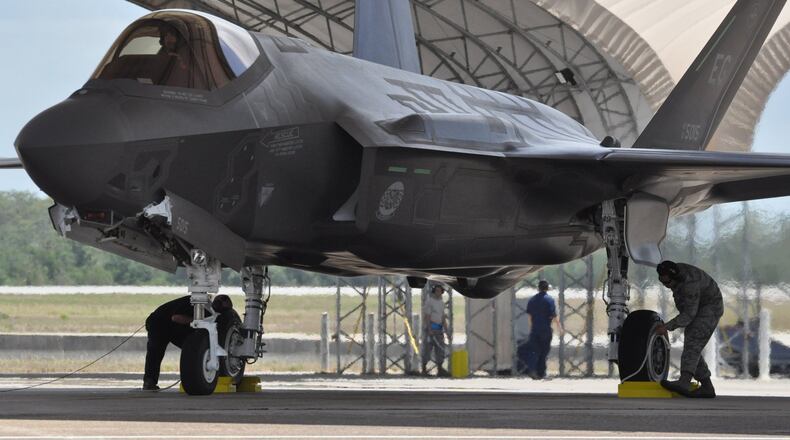“The situation from the perspective of military families and service members is concerning,” said Travis Sharp, a Navy reservist and director of defense budget studies at the Center for Strategic and Budget Assessments, a Washington think tank.
The U.S. Treasury began using “extraordinary measures” last week to provide short-term relief and stay beneath the existing borrowing cap of $31.4 trillion for as long as possible. The measures should allow the U.S. to maintain payments through June, Treasury Secretary Janet Yellen told lawmakers in a letter.
After that, the U.S. could default on its debt, causing “irreparable harm to the U.S. economy, the livelihoods of all Americans and global financial stability,” Yellen said. The U.S. has only technically defaulted on its debt once before, in 1979, due to a bookkeeping glitch.
Congress traditionally raises the amount to avoid breaching the limit but Republicans taking control of the House this month caused an impasse in the process. House Speaker Kevin McCarthy, R-Calif., indicated Republicans want a spending cap in exchange for agreeing to increase the limit while Democrats insist the limit be raised without conditions.
“Hopefully they’ll be able to negotiate a solution. They’ve negotiated solutions before,” Sharp said. “But it’s a lot of brinkmanship, so it might go pretty close to the drop-dead date and make all of us very nervous.”
The uncertainty is bound to add another worry for service members and veterans already contending with the effects of inflation, a possible recession, the coronavirus pandemic and other hardships, said René Campos, senior director of government relations for the nonprofit advocacy group Military Officers Association of America.
“You’ve got all these forces coming at you at one time, there’s so much that needs to be addressed and it’s just not a good place to be,” she said. “I’ve not seen these kinds of major stressors on the uniformed service community and veteran communities in many years, I think they’re unprecedented.”
Life in uniform is not always predictable but those who serve or have served expect their country to honor their commitment, Campos wrote in an article for the association’s members. The crisis over the debt ceiling erodes trust and confidence in Congress and by extension, the military, the longer it goes on, she said.
It can also worsen the military’s recruiting and retention struggles.
“There’s a kind of ripple effect from how Congress works and governs and how they appropriate and authorize legislation to keep the government moving as a whole,” Campos said. “When there are things that prevent Congress and the federal government from operating then I couldn’t imagine that that wouldn’t have some kind of impact on those who are thinking about coming into the military and those in service thinking about doing a full career and staying longer.”
The nation’s volunteer force is fragile, she said, and any disorder at the top flows down to the men and women in uniform at the bottom.
The military suffers when the economy falters, Sharp said. It took months for the economy to recover when the U.S. hit the debt ceiling in 2011. A Republican-led standoff over raising the limit that year caused financial markets to tumble and the U.S. government saw its credit rating downgraded for the first time.
“The American economy is kind of the foundation of our military strength and our military spending,” Sharp said. “Anytime you have potential default on the debt, investors lose faith in the American economy and that undermines the foundations of our defensive power.”
Debate over the debt ceiling also has the potential to impact next year’s military budget.
Republicans in past negotiations have tied spending cuts to increases in the debt limit and that could happen again, Sharp said. Top Republicans said they do not want to place any restrictions on defense spending but the party’s hard-right faction has indicated everything is up for discussion. They could find some allies among Democrats long eager to reduce the Pentagon’s $858 billion budget.
“You can see how the dynamics could shake out that it’s possible — I don’t know how likely — but possible that as a condition to raise the debt ceiling, military spending could be reduced or capped in some way,” Sharp said.
Senate Majority Leader Chuck Schumer, D-N.Y., noted Wednesday that Republicans raised the debt ceiling under former President Donald Trump three times with no conditions or Democratic obstruction.
“So far, we haven’t heard anything beyond vague and troubling talking points about the need to cut federal spending,” Schumer said on the Senate floor. “That’s not going to fly when you are in the majority, as Speaker McCarthy, of course, is. The substance and details make all the difference.”
Unpredictable budgets can lead to an unpredictable military force and wider instability in national defense, according to Campos. The Military Officers Association of America has urged its 350,000 members to engage with members of Congress to remind lawmakers of their obligation to service members and veterans.
But, for now, there is no great concern over the debt ceiling, Campos said.
“People are just in a wait-and-see mode,” she said. “As this goes further, into the weeks and months ahead, a lot will depend on how much Congress is working together.”
(c)2023 the Stars and Stripes. Visit the Stars and Stripes at www.stripes.com. Distributed by Tribune Content Agency, LLC.
About the Author
